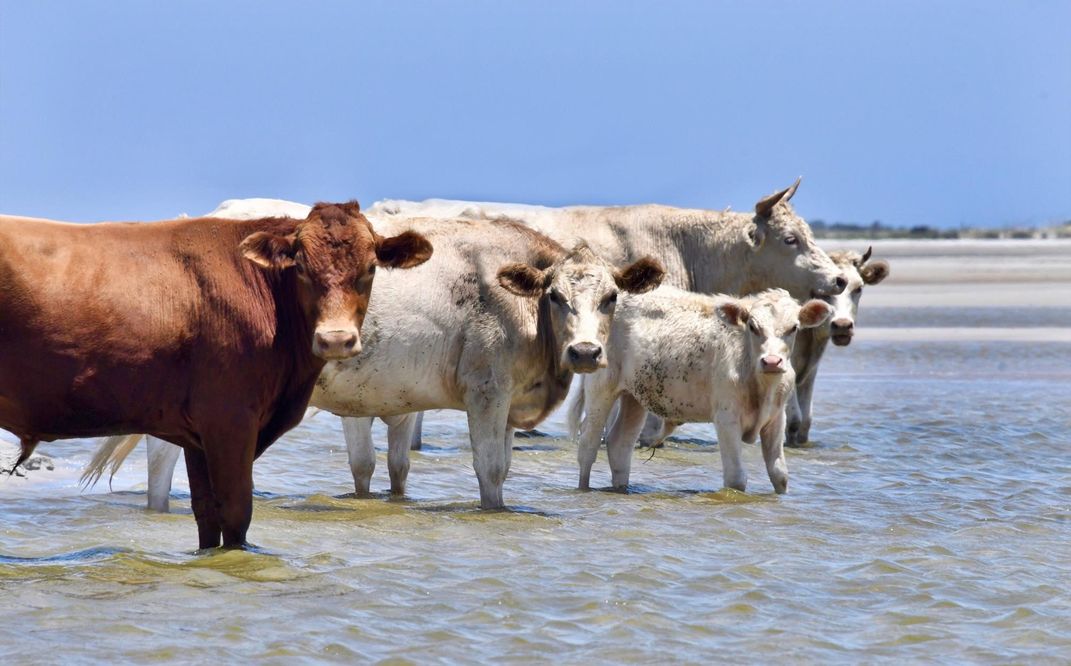Three Cows Swept Away by Hurricane Dorian Have Been Found Alive
Officials think the brave bovines swam between four and five miles to the Cape Lookout National Seashore
/https://tf-cmsv2-smithsonianmag-media.s3.amazonaws.com/filer/d2/04/d204dad7-33f6-4fad-a628-cb3ee2a6398b/74785587_2644556668943090_9209795473433427968_n.jpg)
When Hurricane Dorian crashed into North Carolina in September of this year, a group of wild horses and cattle that lived on Cedar Island, a coastal fishing community, were swept away by a powerful rush of water. The animals were presumed dead. In fact, in the weeks after the Category 1 storm, the bodies of some of the horses began washing ashore.
But in a surprising and happy twist, three of the lost cows have been spotted munching on grass at the Cape Lookout National Seashore, a stretch of the Outer Banks barrier islands that sit off North Carolina’s coast. According to Mark Price of the Charlotte Observer, officials believe the brave bovines swam between four and five miles to get there.
The first cow was spotted just one day after the storm, B.G. Horvat, a spokesperson for Cape Lookout, tells Johnny Diaz and Aimee Ortiz of the New York Times. The other two cows made an appearance three weeks later. Woody Hancock, the caretaker of Cedar Island’s cows and horses, helped identify them. The trio is now grazing together happily on North Core Island, which is part of the national seashore.
“Ever since they found each other, they have been hanging out together,” Horvat says.

Before they were washed away by Hurricane Dorian, the cows belonged to a herd of about 20 cattle that roamed a stretch of privately owned land on Cedar Island. The cows appear to have been pushed out of their home when Hurricane Dorian sent water rushing into coastal rivers, bays and creeks, which in turn sent a storm surge crashing into the Outer Banks. Hancock described the deluge as a “mini tsunami.”
Twenty-eight horses and around 17 cows vanished during the storm, according to the Guardian’s Edward Helmore. And somehow, three of those cows survived. The animals are able to swim, though covering several miles in volatile waters certainly lies outside their typical behavior. Horvat tells the McClatchy news service that he thinks the cows were pushed along by the storm surge. They were lucky to have landed on the Cape Lookout, rather than drifting out into the Atlantic Ocean, where they almost certainly would have drowned, notes Antonia Noori Farzan of the Washington Post.
“Who knows exactly,” Horvat says, “but the cows certainly have a gripping story to share.”
Now, officials have to figure out what to do with the cows. The goal is to transport them back to Cedar Island, where the local community was reportedly “devastated” by the loss of the animals.
Horvat tells Diaz and Ortiz that he hopes to contact the cows’ owner, who will be given 30 days to come up with a relocation plan. If that doesn’t work out, the animals will be the park’s responsibility. One possible method of transportation, Horvat says, is to sedate the cows and bring them back to Cedar Island by ferry—certainly an easier journey than the one they took to get to Cape Lookout.
In the meantime, in spite of what was surely a harrowing ordeal, the three cows seem to be faring just fine on Cape Lookout. “They all ... look healthy and well,” reported the administrator of a Facebook group devoted to Cedar Island’s horses. “It is so amazing how strong and resilient these animals have been.”